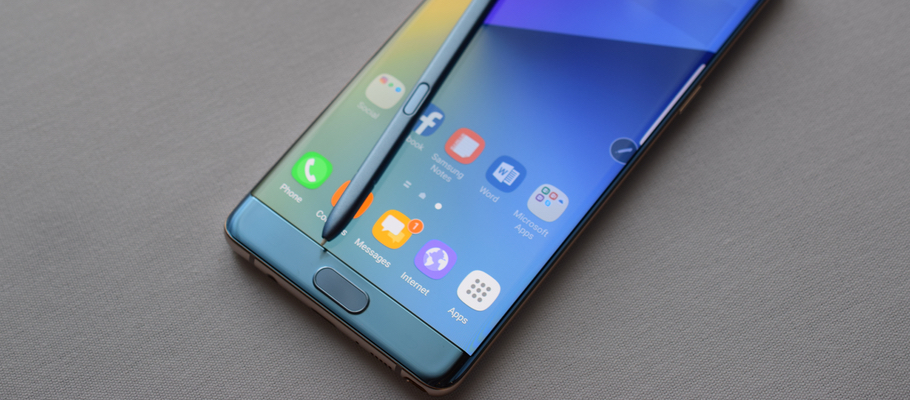I know, I know: the title of this column is bound to already have a few readers burning me in effigy. Sure, any phone with 6GB of LPDDR4 RAM is worth talking about. After all, there are few popular smartphones with 6GB of RAM, and the RAM amount is enough to match a current-day laptop for that matter. So, yes 6GB of RAM in any smartphone is a big deal.
This logic then, presumes that the 6GB RAM Galaxy Note 7 that was discovered months ago when Galaxy Note 7 rumors were new is a big deal. It's even reappeared in benchmarks and carries a price tag, hinting that the leak from months earlier was no photoshop job. And yet, while the sheer RAM amount matters, the existence of the 6GB RAM Galaxy Note 7 does not.
The 6GB RAM Galaxy Note 7 leaked from China and is country-specific
When the leak surfaced months ago, it surfaced from China. China is an important market to Samsung, as is the case with Europe and the North American continent, but not all leaks that surface from China apply worldwide. After all, if we were to naively assume that to be true, then every time a Samsung Galaxy smartphone leaks with an octa-core Exynos processor, then we should assume that only Exynos processors will grace Samsung smartphones worldwide. While such was the case with the Galaxy Note 5, this hasn't been the case with all Galaxy smartphones (hence, the reason why Canada and Europe get the Exynos 8890 in the Galaxy Note 7 while the US and China get the Snapdragon 820).
This is to say that all leaks from China, or anywhere else for that matter, are not always to be universally received: some leaks are region-specific or country-specific, and it's a mistake to assume too much.
The 6GB RAM Galaxy Note 7 is indicative of a different business strategy in China
Since the 6GB RAM Galaxy Note 7 is limited to the Chinese market (we've yet to see the device appear in any other country in device testing), it's apparent that there is a different business strategy for the company in China as opposed to the rest of the worldwide market. This is no surprise: the OnePlus 3 has 6GB of RAM, but remember that it also had its share of problems with a RAM management bug – and the battery life, even with the update that was said to fix the RAM management bug and AMOLED panel color reproduction, is still sub-par.
That doesn't explain why Samsung failed to release a 6GB RAM Galaxy Note 7 worldwide, but the existence of the OnePlus 3 shows a growing tech trend in China where manufacturers set themselves apart by way of the never-ending spec race. Take other markets: a 4GB RAM Galaxy Note 7 will do the job, with those consumers seeing 4GB of RAM as an industry standard; out in China, however, 6GB of RAM is becoming a standard norm – and Samsung, trying to compete there, was compelled to release a 6GB RAM Galaxy Note 7. For example, there are at least 5 high-end Android smartphones from 5 different Chinese OEMs that have 6GB of RAM: the LeEco Max 2, Lenovo Zuk Z2 Pro, Vernee Apollo, Vivo XPlay5 Elite, and the ZTE Axon 7. Of these 5 smartphones, the LeEco Max 2, Lenovo Zuk Z2 Pro, and Vivo XPlay5 Elite topped Antutu benchmark scoring earlier this summer with RAM being one of a few factors that propelled them to the best of the high-end smartphone class.
The Korean giant has been facing stiff competition from Chinese OEMs over the last year, with Samsung developing robots to lessen its dependence on Chinese labor. Chinese companies are buying up Korean firms, which reduces Samsung's role as a potential component supplier, and the memory chip segment (DRAM and NAND flash) is starting to apply pressure on Samsung, too. Chinese brands are now looking to threaten Samsung's throne in the premium TV market, too, so the Chinese threat is not just a mobile problem. This is why we're not surprised to see Samsung sell dual camera modules and its trademark dual-edge design to Chinese rivals: this is what you do when your financial situation changes. No company sells its own R&D work unless it's necessary, and the cutthroat competition in China tells me that Samsung isn't having the same measure of success there as it is in the US, for example.
Samsung's decision to release a 6GB RAM Galaxy Note 7 in China and deny it to the rest of the market shows that Samsung has business strategies (often exclusive ones) that differ from the worldwide market.
The 6GB RAM Galaxy Note 7 doesn't mean Samsung favors the Chinese market
Samsung has made some unfavorable decisions that have been easily interpreted to mean that the Korean giant “doesn't care about other worldwide markets.” The 6GB RAM Galaxy Note 7 shows that Samsung cares about winning the Chinese market, but Samsung's desire is to win in every market, not just China.
Samsung has made decisions in the past that have benefited the worldwide market. Take last year's the Galaxy Note 5, for example: the Korean giant could've simply acquiesced to its partnership with Qualcomm and put the Snapdragon 810 SoC in the Galaxy Note 5, but it utilized its own Exynos 7420 SoC instead. The reason? The Snapdragon 810 was a sub-par processor that would only cause consumer headaches and customer service frustration. Samsung went with its own processor to give customers the best SoC on the market. The Exynos 7420 blew the Snapdragon 810 out of the water, which later confirmed the Korean giant's wise decision.
Samsung's decision to give a 6GB RAM Galaxy Note 7 to the Chinese market comes down to a strategy of contextualization. Contextualization is a practice by which a company or person understands that different markets have different demands. Someone who tours China will not respond to citizens there in the same way as they will with German residents, however. The reason? Because Germany and China are two different places with two different cultures and lifestyles. Someone touring China may find the US market to be an eye-opener in culture because life in both countries is drastically different.
When it comes to marketing, Samsung is a marketing master because it understands the significance of contextualization as being key to company sales. Take the latest Galaxy Note 7 ad released for the US, for example: the ad talks about Americans' “tireless ambition” and celebrates American independence with the colors of its national flag (red, white, blue). Samsung uses American culture in American ads, and cultures from other countries in ads released for those countries. That's the key to winning the market: to understand the priorities of consumers in the intended market.
On the heels of this contextualization, we can see that 4GB of RAM in a device is not the priority of most Americans on the market, for example. It's not even the priority of most Europeans on the market, or of the worldwide market in general. If it weren't for Chinese OEMs trying to “spec-stuff” in order to have an “advantage” over the competition, there wouldn't even be 6GB RAM smartphones in China. How, though, could Samsung compete in China without a 6GB RAM Galaxy Note 7 when many other high-end smartphones in China (that can't match Samsung's feature-packed TouchWiz) will feature 6GB of RAM?
Update: At the time this column was written, there'd been no confirmation from Samsung; the company confirmed today that the high-capacity memory race is to blame for the 6GB RAM variant's release in China, so this article was written in a timely manner indeed.
The same can be said with the company's number change in the phone moniker from “6” to “7”: the strategy is to win in many markets. With the numbers being different, some customers would assume the “Galaxy Note 6” is inferior or old as compared to the “new” Galaxy S7 and Galaxy S7 edge. You could say that you know this isn't the case, but the majority of the worldwide consumer base isn't as tech-savvy as our readership. The number change was made to accommodate the majority of consumers, not to cater to tech-savvy persons who “know better.” Again, Samsung is a marketing master at appealing to the consumer public at large – no matter the culture or level of understanding.
The 6GB RAM Galaxy Note 7 still shares the same moniker with its 4GB sibling
The 6GB RAM Galaxy Note 7, when you stop to think about it, is still the Galaxy Note 7! It doesn't sport a different moniker and doesn't provide any other features that many would consider better. The China Galaxy Note 7 doesn't have Gorilla Glass 5 while the worldwide Note 7 has Gorilla Glass 4, or a 4K display while the worldwide Note 7 has a Quad HD display, or a Snapdragon 830 SoC while the rest of the market gets a Snapdragon 820, and so on.
The only differences between the 6GB RAM Galaxy Note 7 and the 4GB RAM variant is that 1) there's 2GB of additional RAM and 2) the 6GB RAM Galaxy Note 7 gets double the internal storage (128GB as opposed to the new 64GB base storage). With Samsung having doubled the internal storage of even the 4GB RAM Galaxy Note 7 this year from 32GB to 64GB, it can't be said that Samsung doesn't care about its customers having great internal storage. Keep in mind that, as Samsung provided a 128GB Galaxy S6 and S6 edge for the Indian market, only to pull it later, it could do the same with this 6GB RAM Galaxy Note 7 in China. There have never been, nor will there ever be, guarantees in the mobile space).
4GB of RAM will more than do the job for most multi-taskers (even the most tech-savvy ones), and, whether you have the 4GB RAM or 6GB RAM Galaxy Note 7, you still have the best device on the market. It'll take more than just 6GB of RAM to best the most power-packed, feature-packed phablet Samsung has ever made. How anyone can assume that the 6GB RAM Galaxy Note 7 undermines the potent 4GB RAM Galaxy Note 7 (hint: it's the same phone) is a mystery, indeed.
Samsung hasn't gone and renamed the 6GB RAM Galaxy Note 7. Why? Because the company doesn't intend to make the 6GB RAM variant anything worth bragging about. The 4GB RAM device is not “Galaxy Note7” while the 6GB RAM variant is “Galaxy Note7 Prime, for example.” Both are “Galaxy Note7,” with nothing extra in the moniker.
Conclusion
I've spent time here detailing the complex nature of why Samsung would release a 6GB RAM Galaxy Note 7 in the Chinese market while maintaining 4GB variants in all other markets worldwide. It all boils down to contextualization and Samsung's desire to give its Galaxy Note 7 as much of an “edge” in the Chinese market as the 4GB RAM Galaxy Note 7 has in every other market.
In this case, the fact that the 4GB RAM device shares the same moniker as the 6GB RAM variant (“Galaxy Note7”) shows that Samsung sees both devices equally: as the 4GB RAM variant appeals to its intended customer base, so does the 6GB RAM variant appeal to Chinese customers. Samsung never said it would give 6GB of RAM in the Galaxy Note 7. Samsung never promised that all markets worldwide would receive it, nor did the company ever go on record stating as much.
The problem with tech enthusiasts is that they saw the 6GB RAM Galaxy Note 7 in benchmark testing and mistakenly assumed it was intended for everyone. Someone could just as easily see the Lite version of the Galaxy Note 7 (or a Galaxy Note 5 rehash that's appeared in benchmarks) and assume that 1) it will arrive to the market and 2) it will have a worldwide release – but benchmarks are not guarantees of any device's imminent market arrival.
The same could be said for that 6-inch Galaxy Note 7 that we've not yet seen or heard any further information about. And because a device appears in earlier testing doesn't necessitate its final release to the public. Specs that appear in earlier testing, such as the 4,000mAh battery rumored for the Note 7, could be scrapped in the final product by Samsung itself.
Tech enthusiasts who grow in understanding can acknowledge that, even after journalists uncover all the documents, photos, and various spec leaks, all these things are still “subject to change at any time.” Maybe the 6GB RAM Galaxy Note 7 was never intended for a worldwide release from the start, but our salivating tech taste buds drove us to make too large a logical leap. And even now, the 6GB RAM Galaxy Note 7 variant could still be sidelined and never see the light of day. Samsung has the right to test products and then toss them.
It may seem to be a bad decision to some, and it may suit others just fine, but tech companies have the right to do this with their own products. Samsung tossed the Snapdragon 810, and other smartphone components are without exception. Samsung also has the right to release special editions for special markets, despite the “democratic” consumer belief that every device should be accessible worldwide (even I fall prey to this belief at times). Yes, the 128GB Galaxy Note 5 Winter Edition wasn't meant for everyone except Korean residents. That's fine; Google, for example, has a right to release a special Nexus American Edition in the US if it so desires (as OEMs in other countries have the right to release special smartphones for their markets).
Samsung isn't making a big deal out of the 6GB RAM Galaxy Note 7 variant because, to be honest, it isn't a big deal. And if the additional 2GB of RAM doesn't transform the device or give it magical powers over the 4GB model, why should it be a big deal to you?







